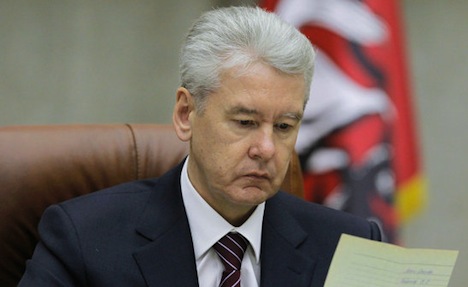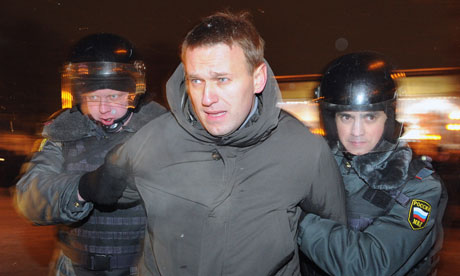Though it’s sometimes easy to forget in the post-Cold War era, Moscow is still the most populous city in Europe and one of the five most populous cities in the world — it not only Russia’s capital, but Russia’s central city for power, politics and finance. ![]()
![]()
That makes the city’s mayor one of the most powerful official in the entire Russian federation and, with snap elections due for Moscow’s mayor in September, it gives some of the most unpredictable voters in Russia the opportunity to make a rare popular statement with five years to go until another presidential election, despite fears that the vote may be titled in favor of the incumbent mayor, an ally of Russian president Vladimir Putin.
Earlier in June, Moscow’s current mayor Sergei Sobyanin announced his resignation, despite the fact that his term runs through 2014, setting up snap elections for September 8 that seem increasingly likely to be an easy victory for Sobyanin as his most viable rivals have either stepped aside or face an uphill challenge even making it to the ballot. Critics immediately called Sobyanin’s resignation and the early elections a ruse to avoid real competition, thereby cementing control over Russia’s largest city within Putin’s grasp.
Elections for Moscow’s mayor are themselves a new phenomenon, given that then-president Dmitry Medvedev and the Russian Duma only reintroduced direct elections for governors and other positions last year, after president Vladimir Putin suspended gubernatorial elections in 2004 on the somewhat dubious rationale of national security and anti-terror efforts. Under the new direct elections law, however, new hurdles have been introduced that require candidates to have the support of other lawmakers in the region. Given that Putin’s United Russia (Еди́ная Росси́я) is by far the dominant political party in Russia, that means Putin will continue to have at least some influence on gubernatorial and local elections.
Moreover, earlier this year, Putin pushed through another law allowing regions to avoid direct elections through an alternative process whereby each party in a regional legislature submits three candidates to the Russian president, the Russian president chooses three finalists, and the regional legislature elects a governor from among the three finalists. (You can’t make this up!)
The man who was most widely anticipated to challenge Sobyanin — former presidential candidate and billionaire Mikhail Prokhorov — opted out of the mayoral race in mid-June when it was clear that he would not be able to meet the legal requirements in time for the snap race. Prokhorov, who formed Civic Platform (Гражданская Платформа), a liberal political party in June 2012 in the wake of his relatively successful presidential race. But Prokhorov, who is the owner of the New Jersey Nets professional basketball team in the United States, would have run afoul of requirements that require his assets to be repatriated prior to serving as Moscow’s mayor.
Prokhorov announced that, rather than supporting a stand-in candidate (such as his sister, Irina Prokhorova), his party would sit out the mayoral election and focus instead on the 2014 Moscow city council elections. In the wake of his 2012 presidential defeat, Prokhorov has treaded lightly on criticizing the Kremlin and even now, as Prokhorov has criticized Sobyanin for rigging snap elections to give himself an unfair advantage, he’s stopped short of criticizing Putin directly.
The Moscow election is especially important because it’s the one region where Putin’s support is at its weakest. In the March 2012 presidential election, Moscow was the only region where Putin polled less than 50% — he won just 48.73% of the vote. In contrast, it was the best region for Prokhorov, who finished second in Moscow with 19.14%. Perennial candidate Gennady Zyuganov, the leader of the Communist Party of the Russian Federation (Коммунистическая Партия Российской Федерации) won 18.85%.
Meanwhile, one of the fiercest critics of the Putin administration is running with the support of the coalition Republican Party of Russia/People’s Freedom Party — anti-corruption activist and blogger Alex Navalny (pictured above being arrested protesting the 2012 election results), who is beset by a corruption trial that Navalny himself claims, with some credibility, is entirely fabricated for political purposes — charges in the provincial town of Kirov of stealing lumber from a state company. Ridiculous as the charges may seem, if Navalny is convicted prior to the election, he would be disqualified from office.
Prokhorov, however, has oddly backed the quixotic candidacy of Sergey Troitsky, the lead singer of a Russian heavy metal band, in the Sept. 8 vote instead, arguing that a vote for Troitsky will make the election more interesting, pointedly refusing to back Navalny.
Sergei Mitrokhin, who leads the Russian United Democratic Party or ‘Yabloko’ (Я́блоко), the party founded by longtime liberal and democratic activist Grigory Yavlinsky, will also run in the mayoral race.
But Navalny will face another hurdle before he makes it onto the mayoral ballot. Under the new direct elections law, however, candidates such as Mitrokhin and Navalny are required to collect 110 signatures — 6% of municipal deputies in at least 75% of Moscow’s municipal districts. Given the steel grip that United Russia holds on power, even in cosmopolitan Moscow, that could prove difficult.
Sobyanin, who is Siberian, came to Moscow only in 2005 when he was appointed as Putin’s chief of staff. He was appointed mayor by then-president Medvedev in October 2010 after Medvedev fired longtime Moscow mayor Yuri Luzkhov, who had been appointed by former Russian president Boris Yeltsin in 1992 amid the turbulent days of Russia’s transition to a market economy following the collapse of the Soviet Union. Luzhkov, whose own presidential ambitions were subordinated by Putin’s rise in 2000, proved successful in holding onto power throughout the 2000s, when Moscow was flush with oil money. As mayor, Luzhkov oversaw massive construction and public works projects for the Russian capital, though critics argued that Luzhkov bulldozed much of Moscow’s history in the name of modernization. Luzkhov often clashed with LGBT activists, and he often orchestrated hurdles to dampen the ability of gay activists to hold demonstrations or parades in Moscow. That policy, if anything, has intensified under Sobyanin, who banned gay pride parades in Moscow in 2011, garnering international criticism when he ordered the arrest of gay activists attempting to defy the gay parade ban, though residents generally give higher marks to Sobyanin, comparing him to Luzkhov in his earliest years.
As an appointee from the Yeltsin era, however, Luzhkov retained his own power base, making him a sometimes tricky and too independent ally for Putin and Medvedev. So while Sobyanin’s policy as mayor is relatively similar to Luzhkov’s — except perhaps with a more muted emphasis on construction — he is much preferred because of his much closer ties to Putin.
Other candidates will also face the same hurdle, including the Communist Party’s candidate, Ivan Melnikov, the party’s vice chairman and a deputy in the State Duma, the lower house of Russia’s federal assembly. Mikhail Degtyaryov, a deputy from the ultranationalist Liberal Democratic Party of Russia (ironically named, given that it’s neither liberal nor incredibly pro-democratic), will also run in the election — not, as originally thought, the colorful, if xenophobic, LDPR leader Vladimir Zhirinovsky).
Second photo — credit to Alexander Nemenov and AFP/Getty Images.


2 thoughts on “Putin ally Sobyanin maneuvers to hold onto power in Moscow in snap September election”